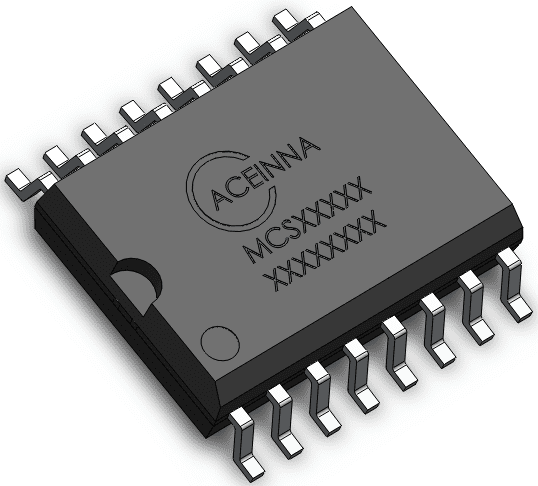ACEINNA today announced its new MCx1101 family of ±5A, ±20A, and ±50A Current Sensors for industrial and power supply applications. The first high accuracy wide bandwidth AMR-based current sensors on the market, units and evaluation boards are available now for sampling and volume shipments.
“Our new integrated, AMR based Current Sensor family provides the best performance for the price in the industry,” says Khagendra Thapa, VP Current Sensor Product for ACEINNA. “There are other AMR based current sensing solutions on the market, but they require a great deal of integration to make them work. Ours are plug and play.”
The MCx1101 are fully integrated, bi-directional current sensors that offer much higher DC accuracy and dynamic range compared with alternative solutions. For example, the ±20A version has a typical accuracy of ±0.6% and are guaranteed to achieve an accuracy of ±2.0% (max) at 85°C.
These new current sensors also guarantee an offset of ±60mA, or ±0.3% of FSR (max) over temperature, which means that high accuracy can be achieved over a roughly 10:1 range of currents. This is a roughly 10x improvement in dynamic range vs. leading Hall-sensor-based devices.
These devices deliver a unique combination of high accuracy, 1.5MHz signal bandwidth with industry benchmark phase shift vs. frequency and 4.8kV isolation making them ideal for high- and low-side sensing in fast current control loops for high performance power supplies, inverters and motor control applications.
The fast response and high bandwidth of the MCx1101 is also ideal for fast switching SiC and GaN based power stages enabling power system designers to make use of the higher speeds and smaller components enabled by wide band-gap switches. Output step response time is 0.3us. The MCx1101 also provides an integrated over current detection flag to help implement OCP (Over Current Protection) required in modern power systems. Over current detection response time is fast 0.2us.
The family includes ±50, ±20, and ±5A ranges, and is offered in both fixed gain (MCA1101) and ratiometric gain (MCR1101) versions. It is packaged in an industry standard SOIC-16 package with a low impedance (0.9 milli-ohm) current path, and is certified by UL/IEC/EN for isolated applications.
All About AMR
ACEINNA is applying its long history, leadership and expertise in Anisotropic Magneto Resistive (AMR) magnetic sensing to AC and DC current sensing. AMR technology has significant advantages vs. other approaches such as Hall, CT (current transformer), and shunt resistors. Compared to Hall-based current sensors, AMR provides significantly higher bandwidth and dynamic range; Compared with CT’s, AMR offers reduced size and cost, as well as response to dc; in comparison with a shunt resistor, AMR provides a fully integrated solution, eliminating the external amplifier and related circuitry required for high voltage isolation, which is a significant challenge at high frequencies. In addition, shunt resistors require enough IR drop to achieve accuracy goals at the low end of the current range, which often means they are dissipating undesirable levels of power at nominal currents. By contrast, the AMR device only measures the magnetic field generated by the current, so the I2R losses can be minimized.
Electronic and electrical power systems drawing over 75W generally require power factor correction and this pushes up the voltage, speed and complexity of power systems. In such designs, fast isolated current measurement is needed. Wide bandwidth and speed is critical as it is a core enabler to go to higher switching frequencies which everyone wants to do but currently can’t easily.
For additional technical details, the ACEINNA MCA1101 and MCR1101 Current Sensor data sheet is available at https://www.aceinna.com/current-sensors.










